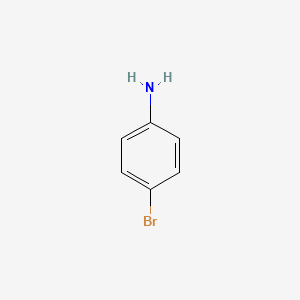



1. 4-bromoaniline Conjugate Acid
2. 4-bromoaniline Hydrochloride
3. 4-bromoaniline Monophosphate Salt
4. P-bromoaniline
1. 106-40-1
2. P-bromoaniline
3. 4-bromobenzenamine
4. Benzenamine, 4-bromo-
5. P-bromophenylamine
6. Aniline, P-bromo-
7. 4-bromo-aniline
8. 4-bromobenzeneamine
9. P-bromo Aniline
10. 4-bromanilinu
11. 4-bromophenylamine
12. 4-bromo-phenylamine
13. Mfcd00007822
14. 0rr61tc330
15. Nsc-7085
16. Dsstox_cid_1867
17. Dsstox_rid_76373
18. Dsstox_gsid_21867
19. 4-bromanilinu [czech]
20. 4-bromobenzenamide
21. Para Bromo Aniline
22. Bromoaniline(4-)
23. Cas-106-40-1
24. Ccris 4591
25. Hsdb 2194
26. Nsc 7085
27. Einecs 203-393-9
28. Brn 0742031
29. Parabromoaniline
30. Unii-0rr61tc330
31. 4-brornoaniline
32. P-bromo-aniline
33. 4 Bromoaniline
34. Ai3-17277
35. 4-bromo Aniline
36. Aniline, P-bromo
37. Para- Bromoaniline
38. 4-aminobromobenzene
39. 4-bromo-phenyl-amine
40. (4-bromophenyl)-amine
41. Aniline,4-bromo
42. 4-bromoaniline, 97%
43. Bromoaniline, P-
44. P-bromoaniline-[13c6]
45. P-bromoaniline [mi]
46. Schembl45481
47. 4-12-00-01497 (beilstein Handbook Reference)
48. Mls002454431
49. Bidd:gt0258
50. Chembl57376
51. 4-bromoaniline [hsdb]
52. Dtxsid7021867
53. Zinc13614
54. Nsc7085
55. Hms3050b09
56. Str00728
57. Tox21_202459
58. Tox21_302910
59. Stk286019
60. 4-bromoaniline, >=99.0% (gc)
61. 4-bromoaniline, For Synthesis, 98%
62. Akos000119091
63. Am10670
64. Ps-3352
65. Ncgc00091730-01
66. Ncgc00091730-02
67. Ncgc00256346-01
68. Ncgc00260008-01
69. Ac-13468
70. Smr001252237
71. Db-023686
72. Bb 0294809
73. Ft-0617852
74. D95300
75. Ac-907/25014110
76. Q412773
77. J-001585
78. J-514801
79. F2190-0431
| Molecular Weight | 172.02 g/mol |
|---|---|
| Molecular Formula | C6H6BrN |
| XLogP3 | 2.3 |
| Hydrogen Bond Donor Count | 1 |
| Hydrogen Bond Acceptor Count | 1 |
| Rotatable Bond Count | 0 |
| Exact Mass | 170.96836 g/mol |
| Monoisotopic Mass | 170.96836 g/mol |
| Topological Polar Surface Area | 26 Ų |
| Heavy Atom Count | 8 |
| Formal Charge | 0 |
| Complexity | 66.9 |
| Isotope Atom Count | 0 |
| Defined Atom Stereocenter Count | 0 |
| Undefined Atom Stereocenter Count | 0 |
| Defined Bond Stereocenter Count | 0 |
| Undefined Bond Stereocenter Count | 0 |
| Covalently Bonded Unit Count | 1 |
p-Bromoaniline metabolized to p-aminophenol in rabbits. From table/
Goodwin, B.L. Handbook of Intermediary Metabolism of Aromatic Compounds. New York: Wiley, 1976., p. B-22
p-Bromoaniline metabolized to p-bromoacetanilide in micro-organisms. From table/
Goodwin, B.L. Handbook of Intermediary Metabolism of Aromatic Compounds. New York: Wiley, 1976., p. B-22
p-Bromoaniline metabolized to p-bromoaniline-n-glucoside in beans. From table/
Goodwin, B.L. Handbook of Intermediary Metabolism of Aromatic Compounds. New York: Wiley, 1976., p. B-22
The metabolic fate of 4-bromoaniline (4-BrA) was investigated following intraperitoneal administration to the rat at 50 mg kg(-1), using high-performance liquid chromatography/time-of-flight tandem mass spectrometry (HPLC/TOF-MS/MS). Up to five metabolites were detected in urine that correspond to isomeric pentose conjugates (possibly ribosides) of a hydroxysulfate of 4-BrA. This identification is supported by further studies where the water used in the reversed-phase solvent system was replaced with deuterated water in order to confirm that the number of exchangeable protons present in the metabolites was consistent with the proposed structures.
PMID:12478557 Major H et al; Rapid Commun Mass Spectrom 17 (1): 76-80 (2003)
The urinary excretion of 4-bromoaniline and its (carbonyl-(13)C)-labelled N-acetanilide, together with their corresponding metabolites, have been investigated in the rat following i.p. administration at 50 mg kg(-1). Metabolite profiling was performed by reversed-phase HPLC with UV detection, whilst identification was performed using a combination of enzymic hydrolysis and directly coupled HPLC-NMR-MS analysis. The urinary metabolite profile was quantitatively and qualitatively similar for both compounds with little of either excreted unchanged. The major metabolite present in urine was 2-amino-5-bromophenylsulphate, but, in addition, a number of metabolites with modification of the N-acetyl moiety were identified (from both the ((13)C)-acetanilide or produced following acetylation of the free bromoaniline). For 4-bromoacetanilide, N-deacetylation was a major route of metabolism, but despite the detection of the acetanilide following the administration of the free aniline, there was no evidence of reacetylation (futile deacetylation). Metabolites resulting from the oxidation of the acetyl group included a novel glucuronide of an N-glycolanilide, an unusual N-oxanilic acid and a novel N-acetyl cysteine conjugate.
PMID:12028665 Scarfe GB et al; Xenobiotica 32 (4): 325-37 (2002)